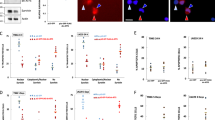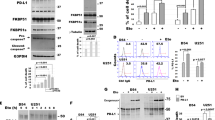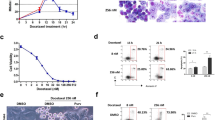Abstract
Survivin is a unique member of the inhibitor of apoptosis protein family, and its expression is regulated by p53. Recent identification of several functionally divergent survivin variants augments the complexity of survivin action as well as its regulation. Here we report that survivin-2B (retaining a part of intron 2 as a cryptic exon) is positively regulated by p53, and its overexpression plays a role in sensitizing leukemia cells to chemotherapeutic drug doxorubicin. Doxorubicin treatment activated p53, downregulated survivin and survivin-ΔEx3 but upregulated survivin-2B in EU-3, an acute lymphocytic leukemia (ALL) cell line with wild-type (wt)-p53 phenotype. In contrast, doxorubicin treatment failed to induce these alterations in EU-6 cells, a mutant-p53 ALL cell line. To specify the role of wt-p53 in regulating survivin and its variants, a temperature-sensitive p53 mutant plasmid p53-143 was transfected into EU-4, a p53-null ALL cell line, to establish a subline EU-4/p53-143. When EU-4/p53-143 cell culture was shifted from 37.5°C to the wt-p53-permissive temperature (32.5°C), the expression of survivin and survivin-ΔEx3 was decreased whereas survivin-2B expression was increased, confirming the distinct regulatory effect of p53 on survivin and its variants. To clarify the role of survivin-2B in the process of apoptosis, survivin-2B cDNA was cloned into pcDNA3HA vector and transfected into EU-4 cells. Enforced expression of survivin-2B in EU-4 cells inhibited cell growth and sensitized these cells to doxorubicin-induced apoptosis. These results suggest that survivin-2B variant is a proapoptotic factor and its expression is upregulated by p53.
This is a preview of subscription content, access via your institution
Access options
Subscribe to this journal
Receive 50 print issues and online access
$259.00 per year
only $5.18 per issue
Buy this article
- Purchase on Springer Link
- Instant access to full article PDF
Prices may be subject to local taxes which are calculated during checkout




Similar content being viewed by others
References
Adida C, Haioun C, Gaulard P, Lepage E, Morel P, Briere J, Dombret H, Reyes F, Diebold J, Gisselbrecht C, Salles G, Altieri DC and Molina TJ . (2000). Blood, 96, 1921–1925.
Badran A, Yoshida A, Ishhikawa K, Goi T, Yamaguchi A, Ueda T and Inuzuka M . (2004). Biochem. Biophys. Res. Commun., 314, 902–907.
Chalfant CE, Rathman K, Pinkerman RL, Wood RE, Obeid LM, Ogretmen B and Hannun YA . (2002). J. Biol. Chem., 277, 12587–12595.
Fridman JS and Lowe SW . (2003). Oncogene, 22, 9030–9040.
Hirohashi Y, Torigoe T, Maeda A, Nabeta Y, Kamiguchi K, Sato T, Yoda J, Ikeda H, Hirata K, Yamanaka N and Sato N . (2002). Clin. Cancer Res., 8, 1731–1739.
Hoffman WH, Biade S, Zilfou JT, Chen J and Murphy M . (2002). J. Biol. Chem., 277, 3247–3257.
Islam A, Kageyama H, Hashizume K, Kaneko Y and Nakagawara A . (2000). Med. Pediatr. Oncol., 35, 550–553.
Jiang ZH, Zhang WJ, Rao Y and Wu JY . (1998). Proc. Natl. Acad. Sci. USA, 95, 9155–9160.
Krieg A, Mahotka C, Krieg T, Grabsch H, Muller W, Takeno S, Suschek CV, Heydthausen M, Gabbert HE and Gerharz CD . (2002). Br. J. Cancer, 86, 737–743.
Kuwabara Y, Mitani M, Shinoda N, Sato A, Toyama T, Mitsui A, Nishiwaki T, Moriyama S, Kudo J and Fujii Y . (2001). Int. J. Cancer, 95, 92–95.
Li F, Ackermann FJ, Bennett CF, Rothernel AL, Plescia J, Tognin S, Villa A, Marchisio PC and Altieri DC . (1999). Nat. Cell Biol., 1, 461–466.
Li F, Ambrosini G, Chu EY, Plescia J, Tognin S, Marchisio PC and Altieri DC . (1998). Nature, 396, 580–584.
Li F . (2003). J. Cell. Physiol., 197, 8–29.
Lopez AJ . (1998). Annu. Rev. Genet., 32, 279–305.
Mahotka C, Krieg T, Krieg A, Wenzel M, Suschek CV, Heydthausen M, Gabbert H and Gerharz CD . (2002b). Int. J. Cancer, 100, 30–36.
Mahotka C, Liebmann J, Wenzel M, Suschek CV, Schmitt M, Gabbert HE and Gerharz CD . (2002a). Cell Death Differ., 9, 1334–1342.
Mahotka C, Wenzel M, Springer E, Gabbert HE and Gerharz CD . (1999). Cancer Res., 59, 6097–6102.
Maxwell SA, Acosta SA and Davis GE . (1999). Apoptosis, 4, 109–114.
Mercatante DR, Mohler JL and Kole R . (2002). J. Biol. Chem., 277, 49374–49382.
Minn AJ, Boise LH and Thompson CB . (1996). Gene Dev., 10, 2621–2631.
Mirza A, McGuirk M, Hockenberry TN, Wu Q, Ashar H, Black S, Wen SF, Wang L, Kirschmeier P, Bishop WR, Nielsen LL, Pickett CB and Liu S . (2002). Oncogene, 21, 2613–2622.
Monzo M, Rosell R, Felip E, Astudillo J, Sanchezm JJ, Maestre J, Martin C, Font A, Barnadas A and Avad A . (1999). J. Clin. Oncol., 17, 2100–2104.
Moyret-Lalle C, Duriez C, Van Kerckhove J, Gilbert C, Wang Q and Puisieux A . (2001). Cancer Res., 61, 486–488.
Pennati M, Binda M, Colella G, Zoppe M, Folini M, Vignati S, Valentini A, Citti L, De Cesare M, Pratesi G, Giacca M, Daidone MG and Zaffaroni N . (2004). Oncogene, 23, 386–394.
Seol DW and Billiar TR . (1999). J. Biol. Chem., 274, 2072–2076.
Swana HS, Grossman D, Anthony JN, Weiss RM and Altieri DC . (1999). N. Engl. J. Med., 41, 452–453.
Tu SP, jiangXH, Lin MC, Cui JT, Tang Y, Lum CT, Zou B, Zhu YB, Jiang SH, Wong WM, Chan AO, Wuen MF, Lam SK, Kung HF and Wong BC . (2003). Cancer Res., 63, 7724–7732.
Xu H and el-Gewely MR . (2003). Oncol. Res., 13, 429–436.
Zhang W, Guo XY, Hu GY, Liu WB, Shay JW and Deisseroth AB . (1994). EMBO J., 13, 2535–2544.
Zhou M, Gu L, Li F, Zhu Y, Woods WG and Findley HW . (2002). J. Pharmacol. Exp. Ther., 303, 124–131.
Zhou M, Yeager AM, Smith SD and Findley HW . (1995). Blood, 85, 1608–1614.
Acknowledgements
This work was supported by grants from the NCI-NIH (R01 CA82323), CURE Childhood Cancer Inc.
Author information
Authors and Affiliations
Corresponding author
Rights and permissions
About this article
Cite this article
Zhu, N., Gu, L., Findley, H. et al. An alternatively spliced survivin variant is positively regulated by p53 and sensitizes leukemia cells to chemotherapy. Oncogene 23, 7545–7551 (2004). https://doi.org/10.1038/sj.onc.1208038
Received:
Revised:
Accepted:
Published:
Issue Date:
DOI: https://doi.org/10.1038/sj.onc.1208038
Keywords
This article is cited by
-
Suppressed diversity of survivin splicing in active rheumatoid arthritis
Arthritis Research & Therapy (2015)
-
Survivin splice variants and their diagnostic significance
Tumor Biology (2015)
-
Survivin-2B promotes autophagy by accumulating IKK alpha in the nucleus of selenite-treated NB4 cells
Cell Death & Disease (2014)
-
Bifunctional roles of survivin-ΔEx3 and survivin-2B for susceptibility to apoptosis in endometrial carcinomas
Journal of Cancer Research and Clinical Oncology (2014)
-
Hydroxycamptothecin induces apoptosis and inhibits tumor growth in colon cancer by the downregulation of survivin and XIAP expression
World Journal of Surgical Oncology (2013)



